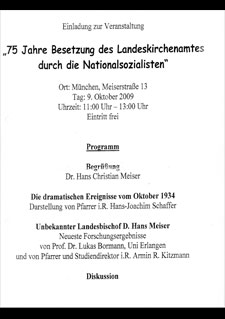Counter-Reactions
The media’s defamatory condemnation of Regional Bishop Hans Meiser (1881-1956) as a “Nazi bishop” and the ensuing spectacular renaming of Meiser Streets in Nuremberg and Munich gave rise to a series of attempts to gather historical evidence intended to exonerate Hans Meiser and restore his worthiness of remembrance.
Pastor and retired high school teacher Armin Rudi Kitzmann particularly rose to prominence by publishing numerous essays and newly discovered historical sources in newspapers and academic journals. Among other things, Kitzmann was able to refute the story that Hans Meiser had refused to attend a memorial service for Dietrich Bonhoeffer because he had been a political rather than a Christian martyr.
Philosopher and journalist Hans Christian Meiser, who, as Hans Meiser’s grandson, was also personally affected by the public degradation of his grandfather, attracted a great deal of attention. He took legal action against the renaming of Meiser-Strasse in Munich, prevented the hanging of a questionable and erroneously formulated memorial plaque on the Munich regional consistory’s offices and put forward the provocative thesis in his book “Der gekreuzigte Bischof” (The Crucified Bishop) published in 2008 that his grandfather had today become the victim of (ecclesio-) political interests – just as in 1934-35, when he had been a victim of Nazis, though (H. C. Meiser, Bischof).
While commemoration of Hans Meiser in the public sphere was obliterated in Nuremberg und Munich, the Caroline Church in Munich-Obermenzing demonstratively named its fellowship hall after Bishop Meiser in May of 2008. A ceremony – not hosted by the church government – commemorating the occupation of the regional churchwide office in October of 1934 was held at the historical site in the regional consistory’s large conference room in October of 2009. New research findings intended to exonerate Meiser were presented at the event.
The pastor and historian Björn Mensing refers to this as a “Renaissance of the old conception of history”, meaning a return of the conception of history of the 1950s in which the Bavarian regional church portrayed itself as a resistance organization. Hans Meiser’s defenders, on the other hand, argue that the current condemnation of Meiser disregards his service just as much as the historical background and personal motive that guided him in his decisions.
Source / title
- © Hans-Christian Meiser, München; Evangelische Arbeitsgemeinschaft für Kirchliche Zeitgeschichte München, Registratur

